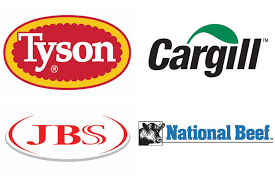The lawsuit claims that food giants reduced slaughterhouse production to keep cattle prices low and beef prices high.
A lawsuit filed last week accuses food giants Cargill, Swift, Tyson, JBS Foods, and National Beef Packing of artificially constraining the beef supply to inflate prices, pad profits and stifle competition.
The suit claims that in 2018 the food companies "sold approximately 80% of the more than 25 billion pounds of fresh and frozen beef sold in the U.S."
The smaller food distributors who filed the suit — including Florida's Quirch Foods and Arkansas' Independent Quality Foods — said they paid higher prices as a result of a “conspiracy” between the defendants and want the titans of the food industry to pay unspecified damages.
Congressional hearings have covered price gouging in the beef sector, and several of the companies named in the suit paid huge fines in recent years to settle price-fixing claims.
Tyson Foods in 2021 paid $221.5 million to resolve a case accusing it of inflating the price of chicken, and last year JBS paid $52 .5 million to settle a case that alleged it inflated the price of its beef.
In congressional hearings last year, executives from Cargill, Tyson, JBS and National Beef denied they were manipulating prices to their benefit and instead attributed cost increases to natural movements in the market.
The hearings covered price gouging during COVID, but the case brought by the food suppliers this week says the price manipulation dates back years.
The suit leans on slaughterhouse production data and the movement of beef prices throughout the 2010s and 2020s but also includes testimony from insiders — dubbed “Witness 1” and “Witness 2” in court papers — with knowledge of agreements between companies like Tyson and National Beef, who allegedly schemed to manage output.
The witnesses, according to the complaint, were privy to conversations about reducing or increasing the so-called kill volumes at slaughterhouses to keep prices favorable for large food companies.
The suit says the defendants at times wanted higher volumes to capture a greater share of the market, and at other times wanted lower volumes to keep beef prices high and pad their profits at the expense of companies further down the supply chain.
The USDA tracks meat production and noted a slight dip in beef produced in the mid-2010s, which corresponds with a spike in value of that beef during that time.
While the USDA does not make data from individual slaughterhouses publicly available, the lawsuit filed Monday says that major food companies like Tyson and Cargill pared back on the number of cows that went through their slaughterhouses, even as smaller producers picked up production.
The plaintiffs say they paid higher prices for the meat supplied to them by the giants of the food industry.
Data on kill volumes at slaughterhouses during the period in question — the mid-2010s — supports the witness's testimony, the complaint says.
“Defendants’ quarter-to-quarter slaughter changes moved in lockstep with each other. This parallelism is consistent with, and the product of, an agreement to jointly manage and reduce slaughter levels below a competitive level,” the complaint reads.
The defendants increased production in 2012 through 2014 to capture a bigger market share, and then decreased production in the following years by an average of 11.3%, the complaint says.
“Defendants' strategy was immediately successful, with lower slaughter volumes and lower beef output resulting in artificially high beef prices, despite cash cattle prices falling. Defendants’ meat margins expanded rapidly as a result,” the complaint reads.
By 2016, the average price for a head of cattle was $16 to $25 higher than it was prior to the agreement between the food companies, the lawsuit says.
The alleged conspiracy outlined in the suit continued into the 2020s, according to the complaint.
The suit was filed in the United States District Court for the Northern District of Illinois, and the plaintiffs have requested a jury trial.











